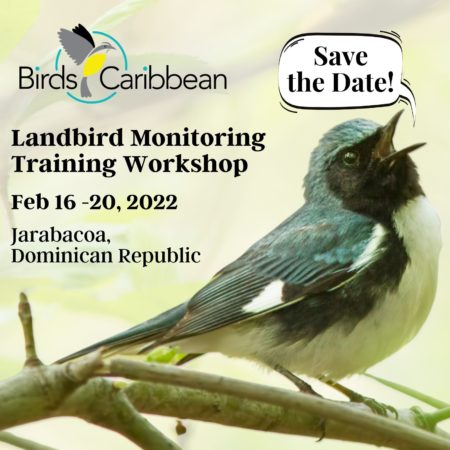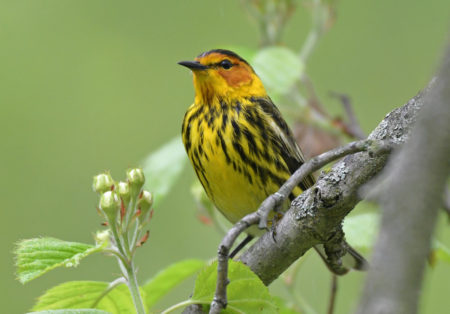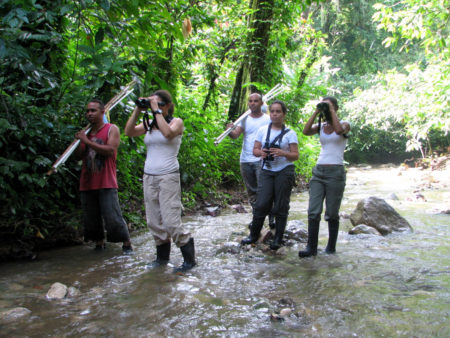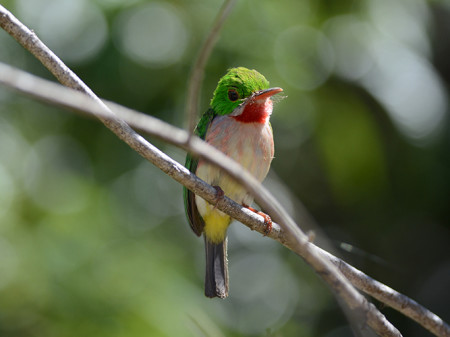 BirdsCaribbean is excited to invite applications to participate in a 5-day training workshop focused on the monitoring and conservation of landbirds in the Caribbean. Through a blend of classroom and field-based activities, this comprehensive workshop will cover landbird identification, monitoring techniques, eBird data entry, basic data analysis, and more. The workshop will take place at Rancho Baiguate in Jarabacoa, Dominican Republic from February 16-20, 2022.
BirdsCaribbean is excited to invite applications to participate in a 5-day training workshop focused on the monitoring and conservation of landbirds in the Caribbean. Through a blend of classroom and field-based activities, this comprehensive workshop will cover landbird identification, monitoring techniques, eBird data entry, basic data analysis, and more. The workshop will take place at Rancho Baiguate in Jarabacoa, Dominican Republic from February 16-20, 2022.
This training workshop is part of BirdsCaribbean’s new project that aims to build capacity to monitor and conserve landbirds in the Caribbean. The long-term goal of this project is to enhance full life cycle conservation of Caribbean landbirds. Working with our many partners, we will build regional networks to increase awareness and appreciation of our landbirds and enable on-the ground conservation actions, including protecting, managing, and restoring important habitats.
We know that this dream can become a reality. We have seen the impact of bird monitoring initiatives like the Caribbean Waterbird Census (CWC), which has provided novel information and helped designate and protect sites that are crucial to the survival of bird populations.
About the workshop
This “train the trainer” workshop is designed for Caribbean wildlife professionals and volunteers who are interested in expanding or establishing a landbird monitoring program.
The purpose of the workshop is to:
- Share information on landbirds in the Caribbean and the threats that they face
- Provide participants with the knowledge and skills to train a monitoring team and institute a sustainable, local landbird monitoring program.
- Inspire and facilitate landbird monitoring and conservation efforts, including raising public awareness, alleviating threats, and managing and restoring habitats
- Build a regional network of people involved in standardized monitoring and conservation of our shared landbirds
Workshop participants will learn about the Programa de América Latina para las Aves Silvestres (PROALAS) Manual bird survey protocols. Developed in Latin America to target tropical habitats, this manual includes detailed guidance on designing and implementing multi-level survey methods. The manual also incorporates the use of eBird as a user-friendly data entry and storage platform, and outlines occupancy-based analysis of monitoring data.
During daily field trips, we will practice landbird identification and survey techniques. After the workshop, participants will have the opportunity to apply for a small grant (~1k to $10k) to implement or amplify their own landbird monitoring and conservation projects.
Topics to be covered in the 5-day workshop include:
- Overview of the PROALAS Manual survey protocols
- Guidance on how to design and implement a monitoring program
- Field training to identify and count landbirds
- Threats to landbirds and their habitats, and strategies to conserve and manage them
- Case studies for successful landbird monitoring and conservation
- Data entry and use of e-bird as a data storage platform
- Basic analysis of monitoring data
In an effort to decrease the amount of time spent in the classroom, some workshop sessions will be held virtually prior to the in-person workshop. These virtual sessions will also be made available to a wider audience. Stay tuned for more information!
Funding and logistics
We are aiming to include approximately 24 participants in this workshop. BirdsCaribbean has limited funding to cover the cost of travel, meals, accommodation, and workshop materials. Participants who are able to contribute all or part of their costs can help us enhance the workshop content and allow us to include additional participants/trainers. Participants should plan to arrive in the Dominican Republic on February 15th and depart on February 21st.
COVID-19 Policy: BirdsCaribbean is committed to the safety of all workshop participants, trainers, and local communities. Proof of full vaccination will be required to participate in this workshop. Additional guidelines (e.g., negative tests, masks) will be provided to participants prior to the start of the workshop based on the most updated information.
If you are interested in participating in this workshop, please fill out this form by 5 PM EST on December 10, 2021.
English Version: https://bit.ly/WorkshopApplication-English
Versión Española: https://bit.ly/WorkshopApplication-espanol
About Rancho Baiguate
Rancho Baiguate is an eco-lodge in the Jarabacoa valley of the Cordillera Central of the Dominican Republic. At 500m elevation, Jarabacoa is known as the “city of eternal spring,” with warm sunny days and cool refreshing evenings. Rancho Baiguate is located on the Rio Baiguate, where participants can walk through restored riparian tropical forest and mixed edge habitat within sustainable agriculture. Birds abound in these varied habitats, and participants will easily see many of Hispaniola’s charismatic endemic bird species, including the two beloved todies (Broad-billed Tody and Narrow-billed Tody) and the national bird, the Palmchat. The town of Jarabacoa is an easy 5 minute drive from the lodge, and participants can visit any of the three stunning waterfalls nearby. Field trips may include visits to nearby reserves such as Ebano Verde. After the workshop, participants are welcome to extend their stay and try any of Rancho Baiguate’s adventurous activities including white water rafting, canyoning, or horse back riding. Come learn more about landbird monitoring with some of the Dominican Republic’s finest birds!
If you have any questions, please send an email to Project Manager Maya Wilson (Maya.Wilson@BirdsCaribbean.org).
BirdsCaribbean would like to thank J.C. Fernández-Ordóñez for Spanish translation.




Estoy in teresado en participar en la capacitación de las aves ya que colaboro SOH con el ministerio medio ambiente y recursos naturales.
Hola, gracias por tu interés en este taller. ¿Solicitó asistir? Si es así, nos comunicaremos con usted pronto. Si tiene alguna pregunta, comuníquese con Maya Wilson, la gerente del proyecto (Maya.Wilson@BirdsCaribbean.org)